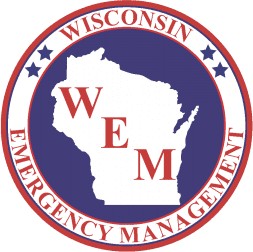 AT&T’s Satellite Cellsite on Light Truck (right) deployed next to the state’s Site on Wheels trailer (left) at the 2019 American Birkebeiner. Submitted photo
AT&T’s Satellite Cellsite on Light Truck (right) deployed next to the state’s Site on Wheels trailer (left) at the 2019 American Birkebeiner. Submitted photo
Every February, 30,000 skiers and spectators descend on northwestern Wisconsin to take part in the largest cross-country race in North America, the American Birkebeiner. The more than 30-mile race from Cable to Hayward, known as the “Birkie,” tests the endurance of skiers. It also creates a huge emergency communications challenge for first responders.
“We have been requested by Bayfield and Sawyer Counties to assist in improving on course communications over the past couple years,” said Wisconsin Interoperable System for Communications (WISCOM) Program Manager Josh Ripp. “Emergency communication is difficult at best in isolated areas, such as those that exist in the Northwoods. Trying to get radio coverage from EMS staff attending to injured skiers out on the course to the main first aid station can be tricky.”
In recent years, the Office of Emergency Communications (OEC), which is part of the Wisconsin Department of Military Affairs, and Wisconsin State Patrol Engineering and Communications staff have brought the state’s Site on Wheels trailer (SOW) to the Birkie event, which provides temporary radio system coverage. The challenge has been connecting to the rest of the WISCOM system to provide seamless coverage across sites in area. This connection is usually made using existing cellular data networks.
“Unfortunately, with the number of spectators and skiers, there was too much network congestion to get through those usual pathways,” Ripp said.
For the Feb. 20-23 Birkie weekend, OEC was able to coordinate a new resource to help with public safety communications. As part of being a member of the First Responder Network Authority, or FirstNet, the state now has access to AT&T’s Satellite Cellsite on Light Truck, known as SatCOLT.
SatCOLT is a deployable truck that provides first responders with similar capabilities and connectivity as a cell tower. Emergency officials used portable radios and the Band 14 spectrum, part of the FirstNet broadband network dedicated to public safety, to communicate. When SatCOLT was combined with the SOW, responders were able to stay connected and operate even in the most remote areas along the race.
In December 2017, Wisconsin became one of several states to opt in to the FirstNet plan. AT&T was selected to develop the national broadband advanced technology initiative to help improve public safety communications. One of the state’s requirements was to have a deployable vehicle, such as a SatCOLT, located in Wisconsin and available to help with interoperability issues — especially in rural areas during events and emergencies.
“It worked wonderfully,” Ripp said. “We know it helped EMS crews communicate and get appropriate help for those skies and spectators that needed first aid.”
Following this year’s success, Ripp said they plan to use the SatCOLT for future Birkebeiners, as well as other planned events and potential emergencies. The SatCOLT is located in the Green Bay area and there is no charge for use.

